“Step out of your cave and look around”
Unit Four: Travelling
4.4.”Step out of your cave and look around”
Word Bank | Phrase Bank | Communication Box: how to express admiration |
Sea-dog Pile Jersey Seasick | To have something round The corner To get drowned To wake from one’s sleep Round-the-world trip To fall overboard To do smth in time | What do you think of… ? Do you know… ? He is the most…. I know. Wow! Isn’t it remarkable! I can’t help admiring… . How admirable! |
I. Conversation Warm-up:
Read and say what characteristics of travellers you admire most of all.
Courage | Curiosity | Persistence |
Friendliness | Strength | Intelligence |
Example:
II. Pronunciation Warm-up:
Read and practise the sound /w/. Say what great explorers you know.
DISCOVERY LIMERICK
Do you know Professor Twist?
He is a well-known scientist.
One day he went to explore the world
And discovered a place
Which he admired and called,
“Wonderful, wonderful Wow-land!
III. Function Smart.
Read and learn how to express admiration for great explorers. Look at the pictures and fill in the mini-dialogues.
A) – Do you know… ?
– Yes, of course I do. He is the most famous explorer I know.
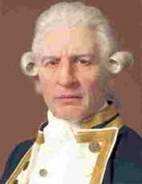
Captain Cook
B) – James Cook discovered…
– Wow! Isn’t it remarkable!
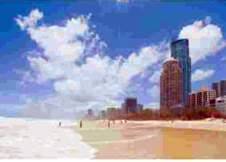
Australia
C) – What do you think of…?
–
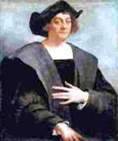
Christopher Columbus
D) – Captain Cook made three journeys by sea to… .
– How admirable!
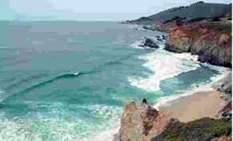
The Pacific Ocean
IV. Word Smart
1. Miss Joy knows much about the round-the-world travel. In pairs, ask and answer the questions. Use the pictures below.
A) Where was James Cook from?

The Union Jack
B) What can the seaman who has travelled round-the-world wear?
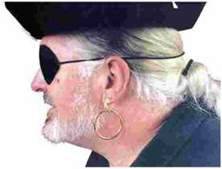
An earring
С) What do people call an experienced traveller?
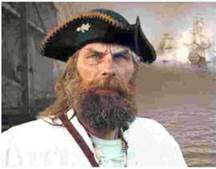
Sea-wolf
D) What English writer wrote about sea travel?
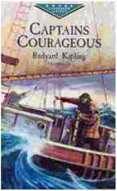
Rudyard Kipling
“Captains Courageous”
3. Complete Miss Joy’s Story and retell it to a friend.
MISS JOY’S STORY
We, the English, live on the islands and always have… round the corner. We have a lot of famous… . One of them is… . He was a real… . In his crew there were several… . who wore… because… . You can read about… in the book “Captains Courageous” by… . This… is popular with English children.
At home: Describe your attitude to travellers.
Go to Ex. 65, 66 of your Workbook
V. Time to read.
1. Read the sea story and answer the following questions.
A) What happened to the boy at sea?
B) Who saved him?
C) What did the man look like?
THE SEA STORY
The sound of the waves woke Harvey from his sleep. Slowly he opened his eyes and remembered that he was Harvey Cheyne who nearly got drowned in the ocean.
The sea was still running round him, but now he lay on a pile of fish, looking at the broad back of a seaman dressed in a blue jersey. The boy tried to say something to him, and the man turned his head. In his ears he had little gold earrings. Harvey understood that the sailor had made several round-the-world trips.
“Aha! You feel better now”, he said. “It was lucky that I caught you. How did you manage to fall overboard?”
“I was sick”, said Harvey, “seasick, and I was very weak”.
“I saw your ship just in time and then I saw you – you were falling down into the sea. Happily, I caught you like a big fish. So you are safe now.”
“Where am I?” asked Harvey.
“You are with me in my fishing boat, my name is Manuel, and I am from the schooner “We’re Here” of Gloucester, but we haven’t returned to it yet.”
Adapted from “Captain Courageous” by R. Kipling
Near – nearly
Hard – hardly
See First Aid Kit,
Word-building, p. 214
Across Culture: Great Britain
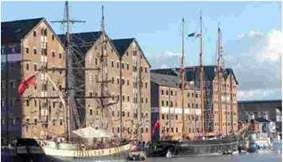
Gloucester – Глостер, місто на південному заході Англії.
2. Fill in nearly or near.
1. Harvey… got drowned in the ocean.
2. They live… London.
3. It took… two hours to get there.
4. She told the children not to go… the canal.
5. Michelle is… twelve.
3. Look at the pictures and say what did not happen at the sea.
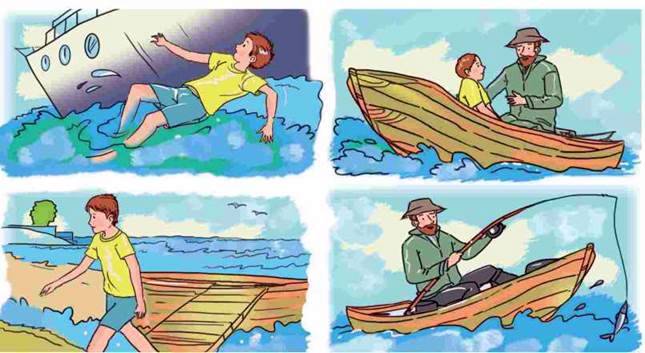
VI. Time to Communicate.
1. Look and tell the boy’s story.
1. Once I was travelling… .
2. Unfortunately, I felt… .
3. I was standing… .
4. The sea was… .
5. Suddenly I fell….
6. When I opened my eyes, ….
7. The seaman had….
8. He explained to me that….
2. In pairs, discuss the boy’s travelling experience as in the pattern.
Pattern:
A: Do you know… ?
B: Yes, of course I do…….
A: Wow! Isn’t it remarkable!
B: What do you think of?
A: I can’t help admiring his….
B: … made a journey by sea with… .
A: How admirable!
3. Describe your most remarkable travel.
VII. Time to Listen
Listen to the story “On a Boat Trip” and answer the following questions.
1. Where did the friends travel?
2. What did they decide to do?
3. Why was the boat trip unforgettable?
VIII. Time to Write
Plan a round-the-world trip of your choice. Use the format (p. 122).
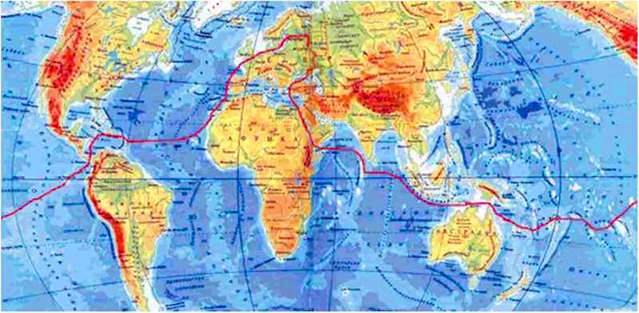

Go to Ex. 67, 68 of your Workbook